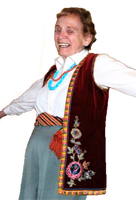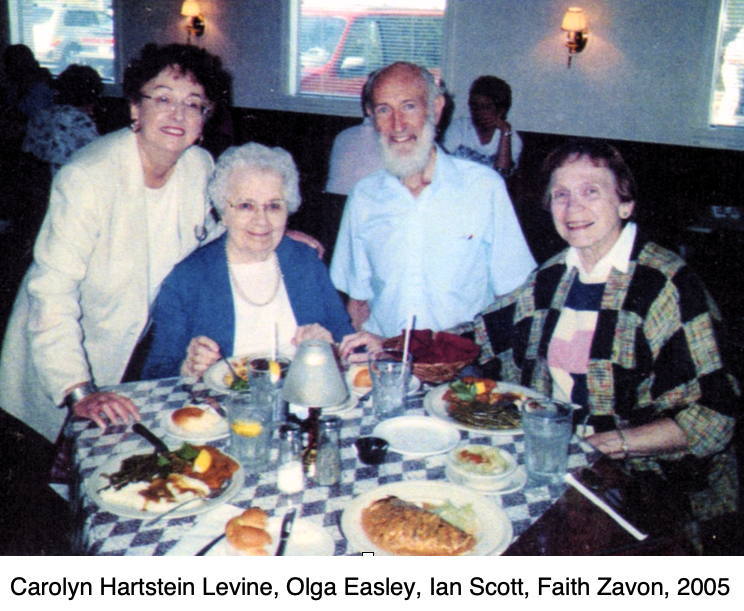
|
The Society of Folk Dance Historians (SFDH) Happiness By Faith Schottenfeld Zavon, March 11, 2013
[
Home |
About |
Encyclopedia | CLICK AN IMAGE TO ENLARGE |

|
Faith Schottenfeld Zavon of Cincinnati, Ohio, was born on September 13, 1923 and passed on September 18, 2021 at the age of 98. She was a prolific writer. Faith was born in Brooklyn and graduated with a BA in science from Brooklyn College. She married and raised four children, working over the years as a food chemist, a bacteriologist, a court reporter, and a legal secretary. She also taught a course in logic at the University of Cincinnati. Faith was a friend of the Society of Folk Dance Historians founder, Ron Houston.
Here is one of her folk dance essays.
 The first sentence in Tolstoy's novel Anna Karenina is: "All happy families resemble one another, but each unhappy family is unhappy in its own way." But a family is different than an individual. So my addition to what Tolstoy wrote is that "Each happy individual is happy in his own way."
The first sentence in Tolstoy's novel Anna Karenina is: "All happy families resemble one another, but each unhappy family is unhappy in its own way." But a family is different than an individual. So my addition to what Tolstoy wrote is that "Each happy individual is happy in his own way."
I find it hard to write about my own happiness, although I consider myself to be a very happy person. Perhaps, my happiness is based on an accumulation of past decisions that turned out to be good ones, and the reading of much philosophy. So I have decided to write about someone else's happiness. Her name was Olga Easley. We met when she was in her early seventies. We were friends for thirty-plus years when she died last year at the age of 104. This is her story.
Olga came to this country from Hungary with her parents when she was five. As a young girl, she and her parents went to the Hungarian dances. That was in the early part of the twentieth century when many immigrants formed ethnic groups for mutual help, dancing, and maintaining their traditions. She loved the Rom music and the soulful Hungarian songs. She never forgot them.
She grew up, became thoroughly American, went to college and graduated, and then married. Her husband came from Kentucky. He knew nothing of Hungarian culture, nor did he enjoy dancing. Olga devoted her entire life to her family – her four sons and her husband. When her children were grown she became a librarian in her local library. Olga and her husband had a long and good life together.
I don't know how long Olga was a widow before the desire to dance again surfaced within her. She hadn't danced since her youth. She expressed this desire to one of her friends who knew me. At that time I was a member of quite a few ethnic groups in Cincinnati. They all had celebrations and dances which I attended along with a group of likeminded friends.
It just happened that when Olga called me there was going to be a Hungarian dance on the coming weekend. We made arrangements for her to come to my house. My other friends would be there too as we had planned to car pool together to go to the dance.
The day came. It was obvious that Olga didn't know what to expect. She came all dressed up complete with a fur stole, and in her hand a box of candy for me.
The evening was a complete success. My friends and I were having a good time with the music, the dancing, the friends, and the food. But Olga was in a state of happiness BEYOND happiness. That is the only way to describe it. She was speaking Hungarian with people she never met before. And she didn't want for dancing partners that night. Everyone asked her to dance. She was the belle of the ball at seventy-two years of age.
After the dance was over and the musicians had left, a large group of Hungarians stayed to sing songs they knew from long ago while one of them played the piano. We stayed too. Olga knew all the songs and joined in the singing. They were singing with heartfelt nostalgia and tears were streaming from their eyes. It was a privilege to be there with them and to feel their intense emotion. Two a.m. came before all of us parted.
Olga called me the next day to say how much that evening had meant to her. She told me she couldn't go to sleep that night. Instead, she played her recordings of Hungarian dance music and danced alone all over her house until dawn.
Olga became a good dancing friend to all of us "ethnic group hoppers." She joined us to dance with the Scots, the Greeks, the Germans, the Polish, and the other Slavs. You name it, she was there dancing with us.
Olga never tired of telling others how she met us, how we had enhanced and changed her life, and how happy she was because of it.
As for myself, just thinking that something I did that led to decades of happiness for someone else makes me deeply, deeply content and gives me a quiet sense of happiness within myself. And THIS connects me with Olga forever.
This page © 2018 by Ron Houston.
Please do not copy any part of this page without including this copyright notice.
Please do not copy small portions out of context.
Please do not copy large portions without permission from Ron Houston.